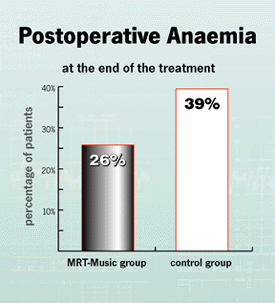Medical Resonance Therapy Music® Group
14 women were treated with Medical Resonance Therapy Music® 2-3 times before surgery and for twelve days after surgery, 1-2 times per day, each time for 30-60 minutes in addition to a conventional treatment with antibiotics, vitamin preparations, anodynes and a disintoxication therapy as well as a physiotherapy. In difference to the control group these women did not receive sedative drugs before and after surgery. At the end of the treatment only 26% of the women indicated anemia, compared to 39% in the control group. This indicates healing inducing effects of the Medical Resonance Therapy Music® in blood formation.
Control Group
In this group 14 women received the conventional treatment only, not listening to Medical Resonance Therapy Music®. Before surgery they received sedative drugs and after surgery they received the conventional treatment. In difference to the experimental group the women here were treated also with sedative drugs after surgery in order to treat their sleep disorders.
At the end of the treatment still 39% of the women had a postoperative anemia – the healing inducing effect of the conventional treatment without MRT-Music® was clearly less.
Investigators:
Prof. Dr. med. G. Gerassimowitsch
Prof. Dr. med. Walentina Sidorenko
Dr. med. Swetlana Scheleg

